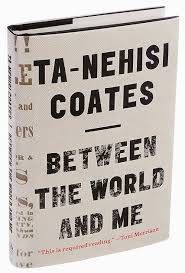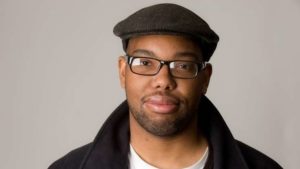Ta-Nahesi Coates wrote Between The World And Me as a personal intellectual and political history, and guide for his son, for thinking about race in th
We need the help. Along with rising inequality and rising oceans, rising racial tension is a defining Top-3 issue of our time.
We each understand the race issue in this country differently. The latest fault lines run between those who believe #BlackLivesMatter and those who respond that #AllLivesMatter. Some see an undeclared war on unarmed black men, while others see equal and compelling evidence for the disrespect and endangerment of uniformed police officers. It sometimes feels like the misunderstanding between these sides must be the worst ever. A little bit of history shows that, no, things may be bad now but they were actually even worse before.
Coates has a stark, powerful, way of describing race relations.
Right now it’s about – and always has been about – control over black bodies. Coates’ long thesis statement below:
“Here is what I would like for you to know: In America, it is traditional to destroy the black body – it is heritage. Enslavement was not merely the antiseptic borrowing of labor – it is not so easy to get a human being to commit their body against its own elemental interest. And so enslavement must be casual wrath and random manglings, the gashing of heads and brains blown out over the river as the body seeks to escape. It must be rape so regular as to be industrial. There is no uplifting way to say this. I have no praise anthems, nor old Negro spirituals…
For the men who needed to believe themselves white, the bodies were the key to a social club, and the right to break the bodies was a mark of civilization. ‘The two great divisions of society are not the rich and poor, but white and black,’ said the great South Carolina senator John C. Calhoun. ‘And all the former, the poor as well as the rich, belong to the upper class, and are respected and treated as equals.’ And there it is – the right to break the black body as the meaning of their sacred equality. And that right has always given them meaning, has always meant that there was someone down in the valley because a mountain is not a mountain if there is nothing below.
You and I, my son, are that ‘below.’ That was true in 1776. It is true today. There is no them without you, and without the right to break you they must necessarily fall from the mountain, lose their divinity, and tumble out of the Dream. And then they would have to determine how to build their suburbs on something other than human bones, how to angle their jails toward something other than a human stockyard, how to erect a democracy independent of cannibalism. But because they believe themselves to be white, they would rather countenance a man choked to death on film under their laws. And they would rather subscribe to the myth of Trayvon Martin, slight teenager, hands full of candy and soft drinks, transforming into a murderous juggernaut.”
So, Coates isn’t going to sugarcoat this for us.
Malcolm vs. Martin
I can’t remember if Coates actually ever mentions Martin Luther King by name in his book (I actually kind of doubt it) but one of the unspoken messages of Between The World And Me is a clear rejection of the King line of thought.
 I know it’s too simple to set up Malcolm X and MLK as the two competing branches of black thought in the twentieth Century, but if you’ll grant me that simplification, Coates roots himself deeply in Malcolm’s camp. First, by crediting him as the initial spur for Coates intellectual journey. Next, in naming his alma mater Howard University “The Mecca,” he references the need and centrality of a gathering point for blacks other than in the Judeo-Christian world. Finally, the enemy Coates identifies most strongly throughout his book, is “The Dream.”
I know it’s too simple to set up Malcolm X and MLK as the two competing branches of black thought in the twentieth Century, but if you’ll grant me that simplification, Coates roots himself deeply in Malcolm’s camp. First, by crediting him as the initial spur for Coates intellectual journey. Next, in naming his alma mater Howard University “The Mecca,” he references the need and centrality of a gathering point for blacks other than in the Judeo-Christian world. Finally, the enemy Coates identifies most strongly throughout his book, is “The Dream.”
The Dream of course is what all us are living – an imagined world of increasing prosperity, justice, keeping our head down, following the rules. For so-called whites1 in America, the Dream can be achieved through going to the right schools and living in the safe suburbs.
Coates recalls being taught in school about the King-inspired Freedom Marches and watching images of a seemingly endless series of beating, clubbings, water-cannoning, and dog-attacks on a compliant, non-resistant, group of blacks.
“The black people in these films seemed to love the worst things in life – love the dogs that rent their children apart, the tear gas that clawed at their lungs, the firehoses that tore off their clothes and tumbled them into the streets. They seemed to love the men who raped them, the women who cursed them, love the children who spat on them, the terrorists who bombed them. Why are they showing this to us? Why were only our heroes nonviolent?”
Maybe, as Coates believes, the message from teaching about the Freedom Marches is a disempowering one. The Dream, in Coates’ telling, is both a comfortable White illusion, and a Black prison of self-imposed subservience. It’s what allows white America to control black bodies. To embrace the Dream therefore – a word that we’ve made short-hand for MLK, the man who had The Dream – is to be complicit in the well-known deaths of Trayvon Martin, Michael Brown, Eric Garner, Freddy Gray, and Sandra Bland, in addition to of course the historical murders of Emmett Till, Medgar Evars, and the children inside the 1963 Baptist Church.
It’s a strong indictment of King’s legacy, even if Coates never mentions the man’s name.
My problem with the book
Coates has forgotten more about writing than I will ever learn, nevermind obviously his specialization in black intellectual history. His writing is amazing. He wins prizes for his stuff in The Atlantic more often than I visit the dentist. So I criticize this book at my peril. However…
Something I selfishly wanted from reading Between The World And Me was the feeling of walking around afterwards vibrating with my new knowledge as the most “Woke” white guy around. I’d read this book and then see race relations with a fresh perspective, offering cool insights and radical sympathy. It’s unfair, but I wanted transformation and I didn’t have that moment. Maybe I was so “Woke” already that I couldn’t improve upon myself? No, obviously not. Maybe I can’t feel the radical sympathy because the cognitive dissonance with my own whiteness would be too far a stretch? I don’t know. But that selfish desire and consequent disappointment affected my view of the book. Which is to say a main problem with this book was my high expectations.
I was more blown away by Narrative of the Life of Frederick Douglass and Taylor Branch’s trilogy on the MLK years than I was by Between The World And Me. Maybe those are unfair comparisons, between absolute all-time classics and a book that just came out last year. But Coates is our best contemporary writer on black America, and a MacArthur winner, so it’s not totally unfair either. I didn’t find myself transformed or breathless or wanting to tell everyone I know to go out and read it. I do think every US Citizen needs to read Taylor Branch’s trilogy in order to vote or to qualify to collect social security. I don’t have that same feeling about Between The World And Me.
Not The audience?
Now, maybe I wasn’t supposed to get that inspired feeling because I’m not the intended audience for Coates’ book. Coates uses the 2nd person voice throughout to address his son specifically, and in that sense this could be seen as a more personal book, or at least a book more directed at Coates’ inner circle than, say, me. His project may not be, in the end, to make so-called white, ex-finance guys, “woke.”
But I do actually think I’m one of his main audiences. He’s in the Style section of the New York Times this month, and I am the Atlantic-reading demographic.2 But what is he doing there if not trying to capture the likes of me?
Coates will remain a top voice on these issues in the decades ahead, so a lot is riding on whether he rises to the occasion. Like I said, we certainly need the help.
Post read (225) times.
- Coates makes the interesting point every time he mentions “whites” that this “so-called” racial designation is as invented as any other. Today’s “Whites” used to be called the Irish, or Jews, or Norweigans, or Italians, or Scots, any number of whom would resist common cause with any other now-designated “white” group. It just became convenient and powerful more recently to unite “whites” under a single designation, for the purposes, Coates posits, of control of black bodies. This seems, unconsciously, true. ↩
- He’s also the latest comic-book author for The Black Panther, which obviously also makes him cooler than me in every way. ↩



